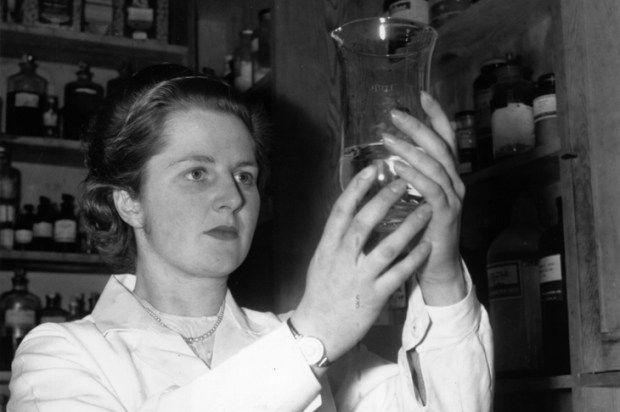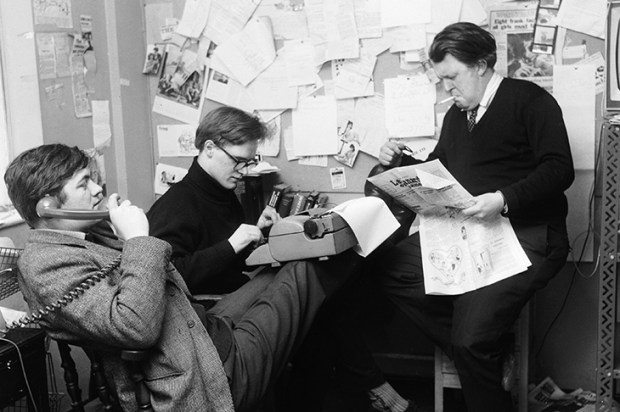Now that my youngest has got her A-level grades, I’m finally free to say just how much I have loathed the past 20 or so years I have spent helping my children with their English homework.
This is a sad admission. After all, I studied English at university and still love reading classic literature and learning poetry by heart. But when I read that the number of 18-year-olds taking English A-level has plummeted to its lowest level since 2001 I wasn’t at all surprised. If I were that age, I’m not sure I’d choose to do English either.
The first taste I had of just how grisly English has become was when I helped the Rat with his GCSEs. I don’t think at any stage he was required to complete an actual book. Instead, he studied what were known as ‘texts’ — gobbets of often third-rate prose and poetry, selected either for its diversity (Maya Angelou) or its accessibility (including, I seem to remember, random verbiage written by children). Maybe whoever set the course had been to the same Terry Eagleton lecture that I had — ‘Why study Shakespeare when you can study the telephone directory?’ — but didn’t realise it was an intellectual joke.
Things got even less fun when I tried to help Boy prepare for Oxbridge. I gave him two hefty ring-binders containing the essays I’d written at school and university. They stood up quite well, I thought: fluent, playful, with the occasional insight worthy of a little red tick in the margin. And a sight more enjoyable than the turgid, convoluted, achingly worthy toss that Boy was required to produce for his teachers at school.
Boy isn’t stupid. He won one of his school’s top competitive English prizes, beating all the King’s Scholars. But wading through his essays was a chore. There was far too much jargon and an excess, it seemed to me, of the kind of laboured, navel-gazing, close critical analysis they take especial delight in at Cambridge; and far too little of the panache and ludic wit and flights of imagination which are — or rather, I fear, were — the speciality of Oxford. To me, it felt tragically like the Tabs (or the Puritans, if you prefer) had won the argument as to how English should be studied: to within an inch of its life. By the time I got to Girl’s English A-level I was ready to give up. So was she.
English is taught at advanced level, now, as if it were a science. It’s about pushing buttons. You are marked according to how well you have achieved various ‘assessment objectives’, as decreed by Ofqual. AO1 is ‘Articulate informed, personal and creative responses to literary texts, using associated concepts and terminology, and coherent accurate expression’ (hence, I suspect, that excess of critical jargon the kids all cram into their essays now); AO2 is ‘analyse ways in which meanings are shaped in literary texts’; and so on.
Also — in an attempt to make English seem ‘relevant’ — the course seems to embrace a lot more modern stuff. Yes, I do recall having to study Faulkner’s As I Lay Dying in the 1980s. But mostly our course back then comprised rock-solid classics, studied in depth: Emma and Pride and Prejudice; Othello and King Lear; The Waste Land; etc. Girl, on the other hand, studied only one Shakespeare play — Twelfth Night; she also did Sir Gawain and the Green Knight (but only in translation). And there was far too much American literature — including the dreaded Of Mice and Men; and too much contemporary stuff, such as The Yellow Birds, a 2012 novel about the Iraq war — and Pink Mist, a 2014 play by Owen Sheers. I think it’s unrealistic to expect from teenagers a coherent response to literature so recent it hasn’t had time to bed down.
I’m not blaming Girl’s hard-working, caring teachers for this. They did their best for her, often giving up their spare time for extra tutorials. Still, though, their main, grinding task — methodically to prepare their classes to get through their exams — left Girl feeling somewhat uninspired. I feared she was almost bound to get a mediocre grade, till one day she hit on the bright idea of getting extra tuition in the holidays.
‘I’ve found someone on Gumtree!’ she announced one day. ‘Oh dear,’ I thought. (Isn’t Gumtree where you go to arrange sordid extra-marital liaisons?) ‘He used to be head of English at Eton,’ Girl said. ‘And he won’t tutor you unless he’s interviewed you first to see if you’re suitable.’
This sounded promising. And sure enough, Nick Welsh proved Girl’s salvation. He was firm (nearly refusing to carry on teaching her after she had failed to prepare for one of his sessions), erudite (lots of fascinating digressions about Shakespeare which, obviously, her hard-pressed teachers at school would never have found time for) and utterly inspirational.
Girl, who had once declared she found Shakespeare boring and pointless, now grasped Twelfth Night so thoroughly that she was getting near top marks in all her essays. Nick had taught her at least two invaluable things: first, that you’re never going to get Shakespeare unless you’ve put in all the groundwork and know the text inside out; second, the joy and excitement of coming up with your own, original critical insights.
‘I’ve been studying Twelfth Night for more than 50 years but I’ve never considered that angle before,’ Nick told Girl, after one point she’d made. She came home elated: ‘So I’m not stupid, after all!’
What I can’t work out, I’m afraid, is a solution to this more general problem. Nick is an inspirational teacher in the same way my brilliant Oxford tutor Peter Conrad was. If you’re lucky enough to find one then you’ve won the English lottery; if you haven’t, you’re probably stuffed.
Got something to add? Join the discussion and comment below.
Get 10 issues for just $10
Subscribe to The Spectator Australia today for the next 10 magazine issues, plus full online access, for just $10.
You might disagree with half of it, but you’ll enjoy reading all of it. Try your first month for free, then just $2 a week for the remainder of your first year.















Comments
Don't miss out
Join the conversation with other Spectator Australia readers. Subscribe to leave a comment.
SUBSCRIBEAlready a subscriber? Log in